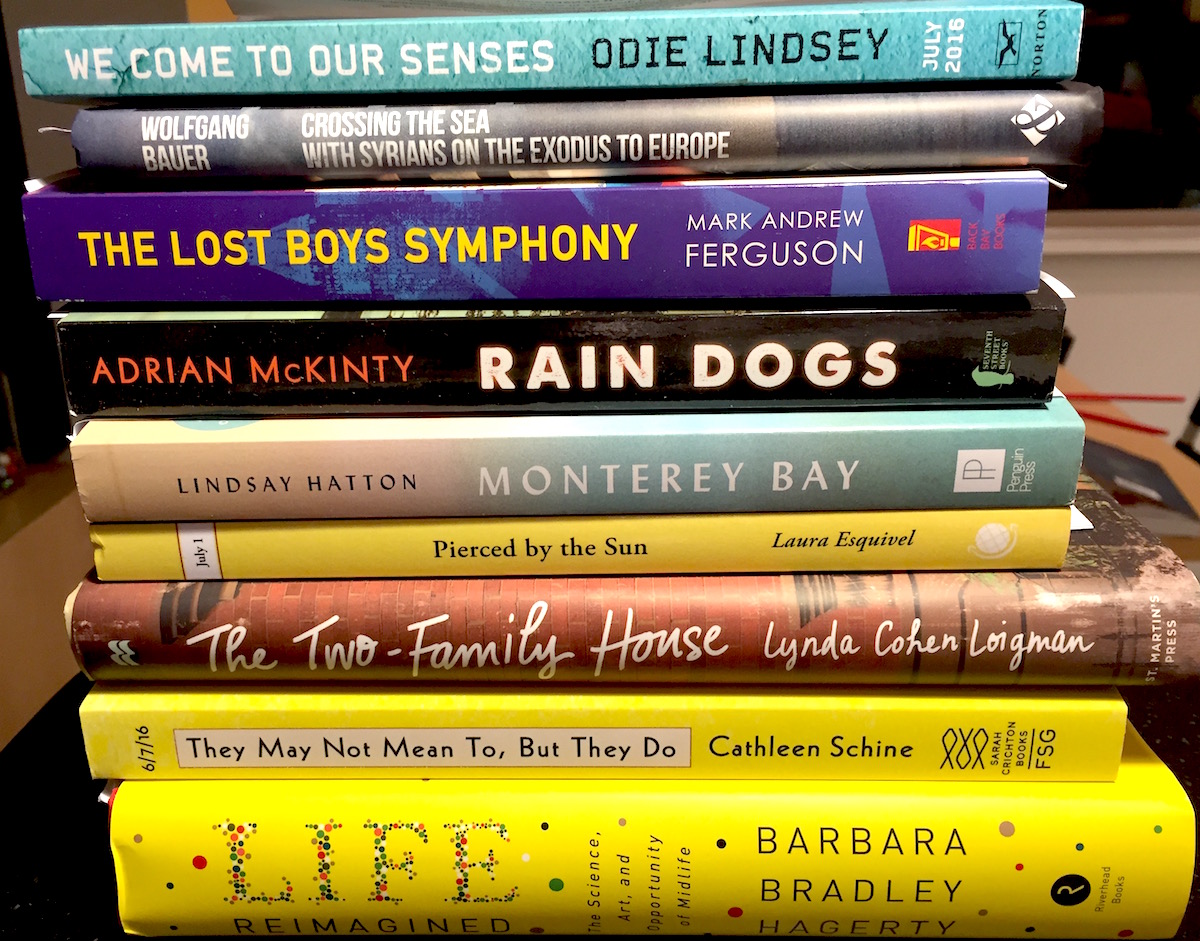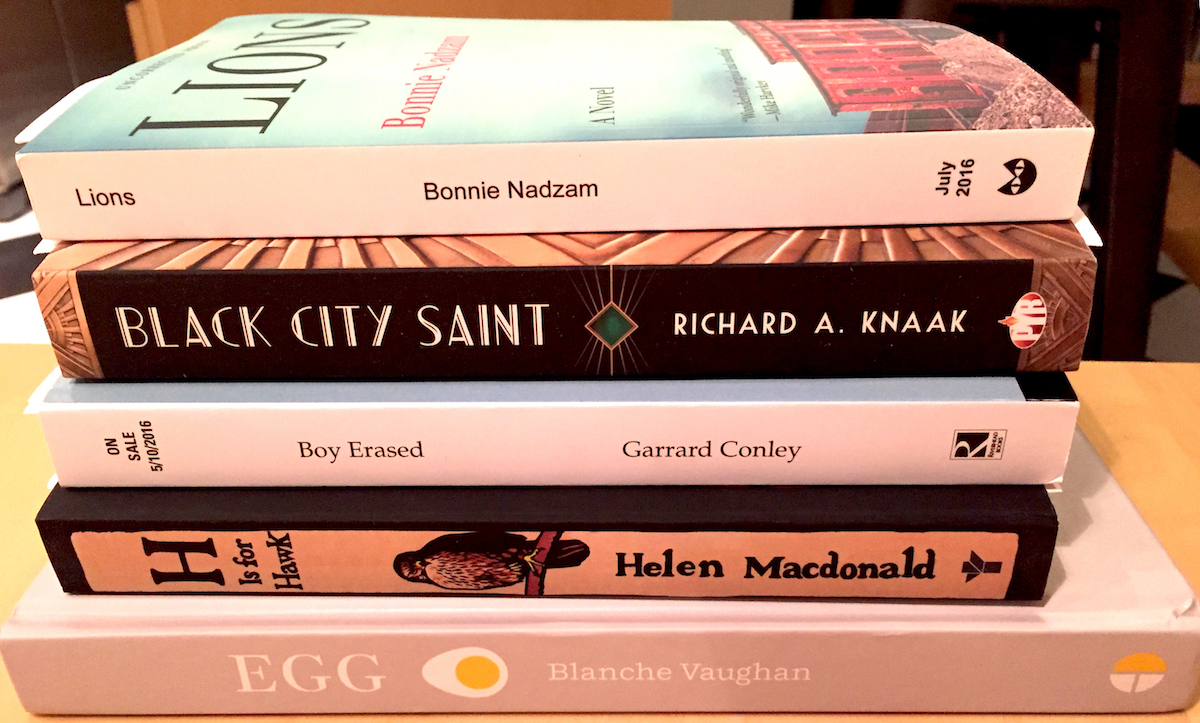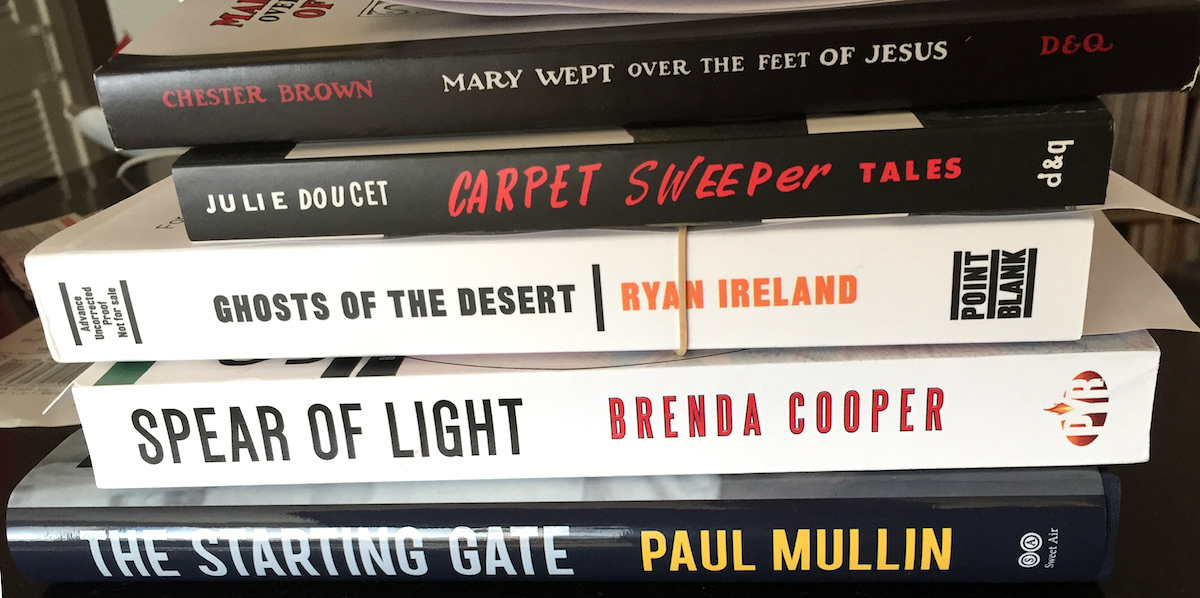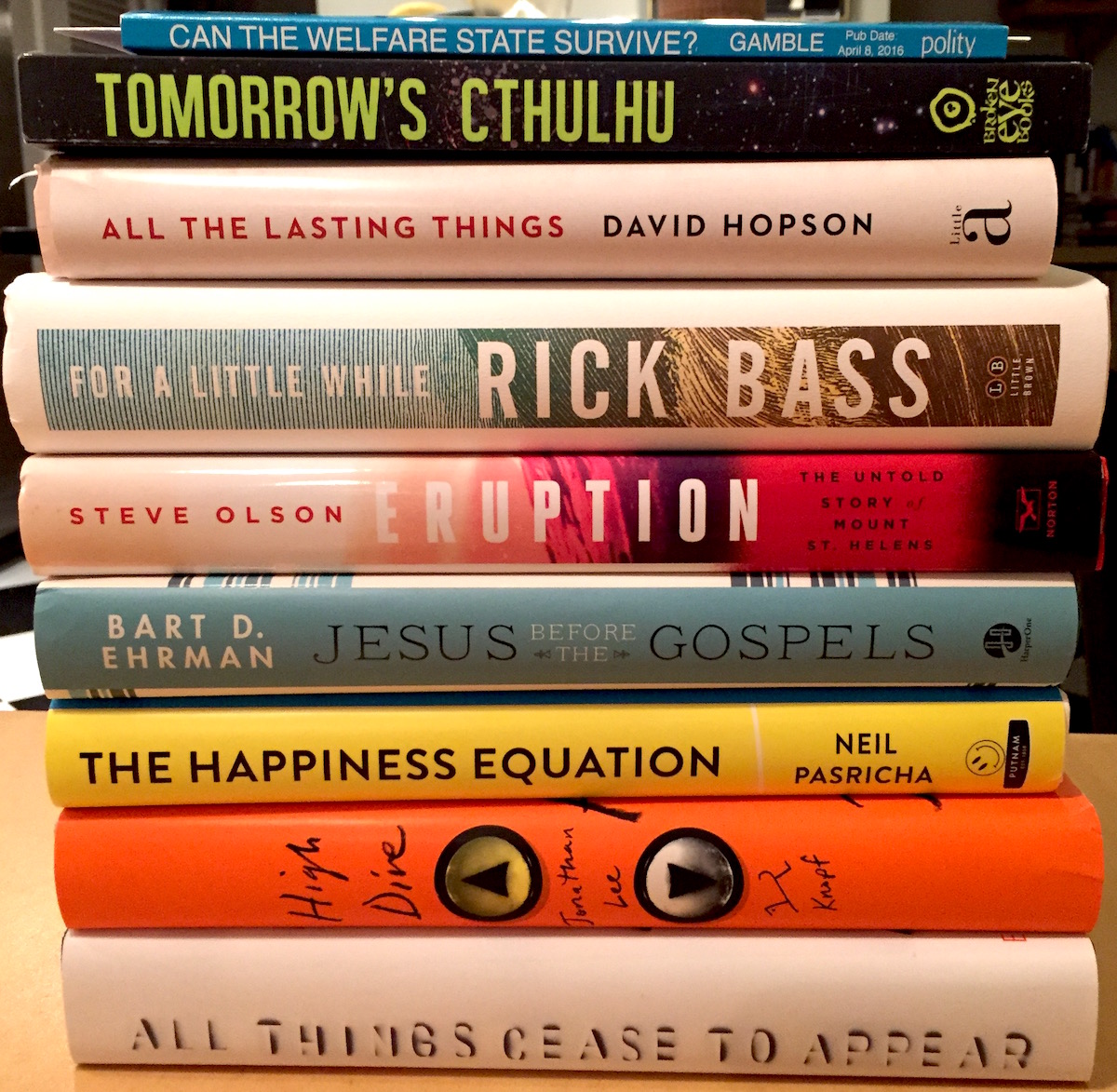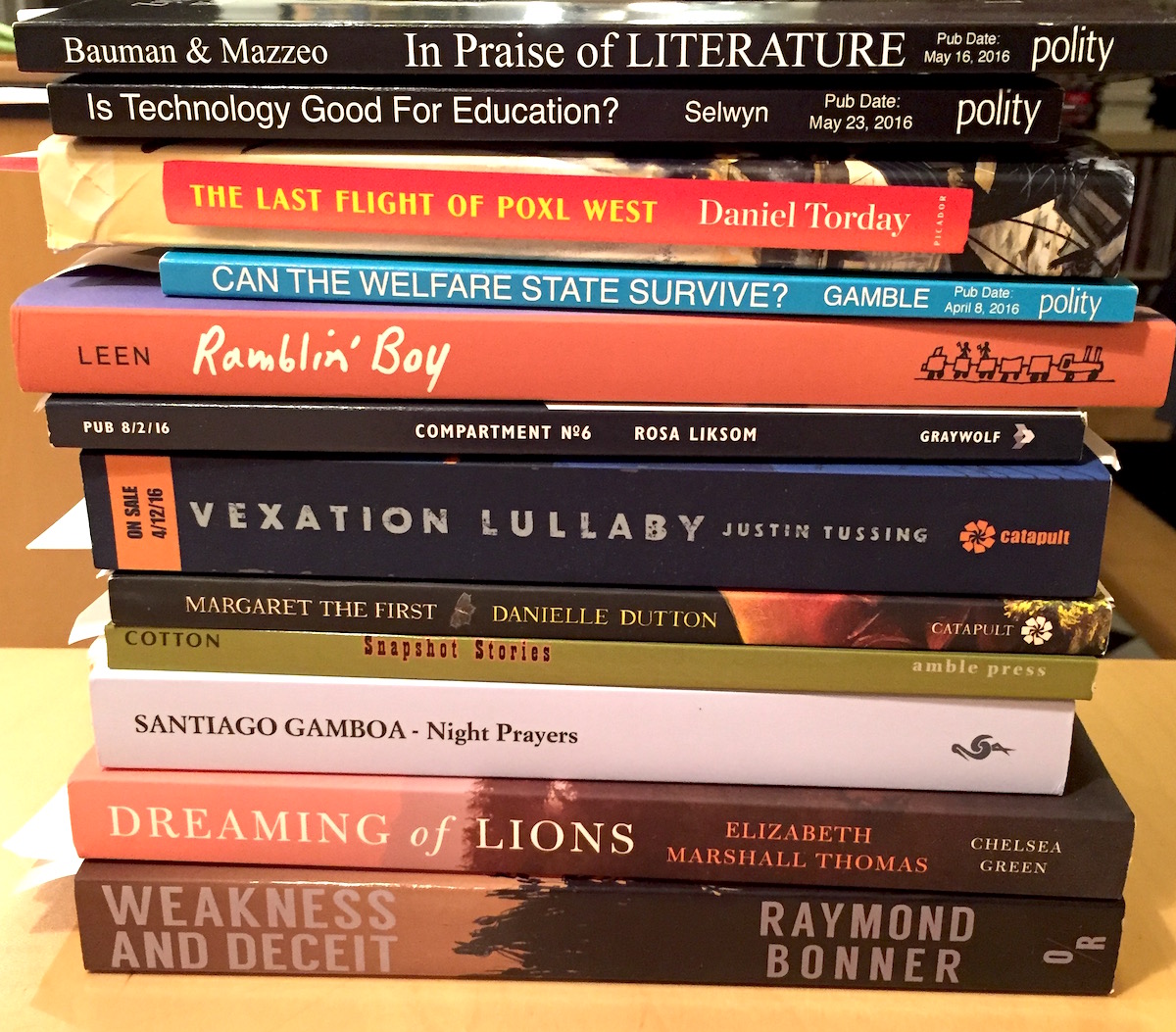Upside Down: Inverted Tropes in Storytelling Anthology - Kickstarter Fund Project #8
Every week, the Seattle Review of Books backs a Kickstarter, and writes up why we picked that particular project. Read more about the project here. Suggest a project by writing to kickstarter at this domain, or by using our contact form.
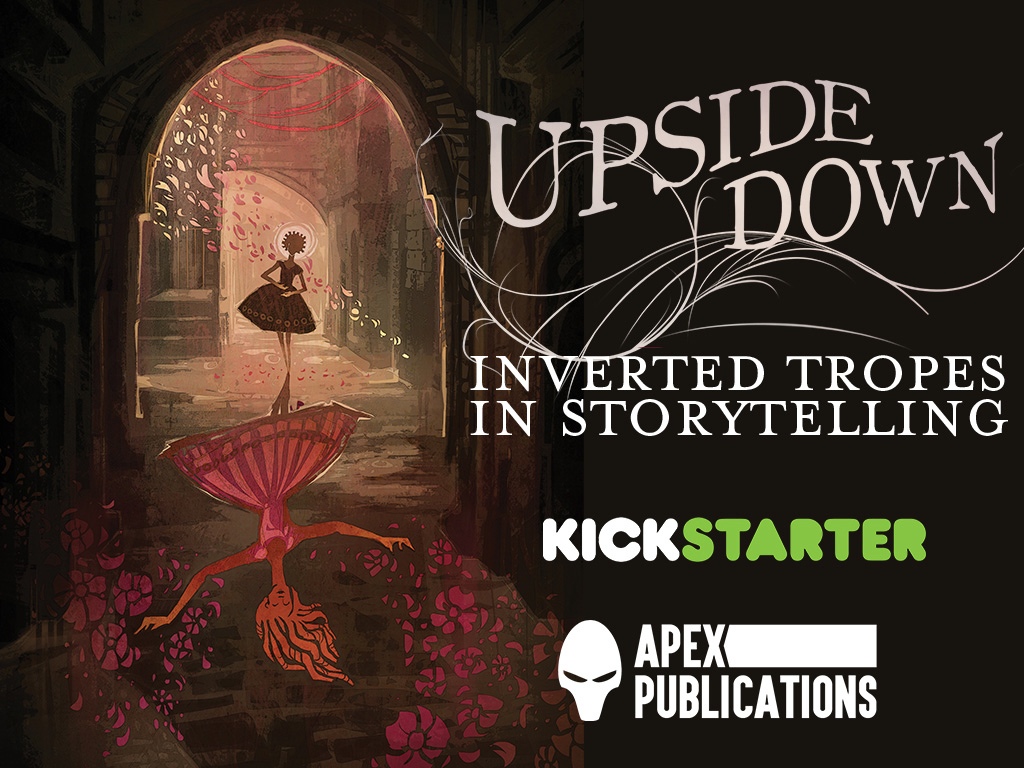
What's the project this week?
Upside Down: Inverted Tropes in Storytelling Anthology. We've put $20 in as a non-reward backer
Who is the Creator?
What do they have to say about the project?
Upside Down is a collection of short fiction. Each story examines a tired trope or common cliche and twists it into something new!
What caught your eye?
What a fun project. Short fiction that takes a trope — Prostitute with a Heart of Gold; the City Planet; The Singularity Will Cause the Apocalypse; Heroine Loves a Bad Man; The Magical Negro, just to name a few — and flips it in some way.
The editors leave it up to the author to decide how to destroy the trope they chose, so no doubt there will be a lot of imaginative upending of some hoary old cliches.
Plus the production values look great — nice artwork, nice video, nice presentation.
Why should I back it?
A ton of reasons, but here's a good one: Seattle's own Nisi Shawl is included.
Plus it's cheap! Get the ebook for $5, or the softbound print copy for $15.
How's the project doing?
28 days to go, and they're 45% funded. It's a good bet they'll make it.
Do they have a video?
Kickstarter Fund Stats
- Projects backed: 8
- Funds pledged: $160
- Funds collected: $100
- Unsuccessful pledges: 0
- Fund balance: $880
On the same weekend that Seattle Mystery Bookshop's GoFundMe campaign draws to a close, Wallingford's delightful Wide World Travel & Maps — the oldest travel bookstore in the country — has launched their own GoFundMe campaign. They're looking to raise $30,000, and according to Shelf Awareness, Rick Steves' Europe has donated a compelling travel package if the store hits its goals.
As I said when Seattle Mystery Bookshop announced their campaign, if crowd-funding isn’t your thing but you like to support independent bookstores, stop by Wide World Travel & Maps — they’re at 4411 Wallingford Ave N — and pick up a few books to prepare for an upcoming vacation, or a trip that you hope to one day make. What is a travel bookstore, after all, but a promise you make to yourself?
The Help Desk: My local Little Free Library is a disaster
Every Friday, Cienna Madrid offers solutions to life’s most vexing literary problems. Do you need a book recommendation to send your worst cousin on her birthday? Is it okay to read erotica on public transit? Cienna can help. Send your questions to advice@seattlereviewofbooks.com.
Dear Cienna,
The Little Free Library closest to my house is often full of crap. I'm talking outdated programming books and collections of VHS tapes and other things that stay in the LFL for weeks and weeks because no one wants them. The structure is not in someone's front yard, so it's unclear who is responsible for it. I'm tempted to weed the LFL myself, tossing the old crap and filling it with newer novels, audio books on CD, hardback non-fiction titles. (I just KonMari-ed my bookshelves, so I have lots of goodies to contribute.) Would that be overstepping?
Thanks,
Alyssa, Capitol Hill
Dear Alyssa,
I admire your “go-getter” attitude. Personally, I’ve never been convinced of the community benefit of those tiny libraries. To me, they are what you’ve experienced: twee trash cans adored and installed by middle- and upper-class individuals who believe that their poorer neighbors will treasure their garbage.
But I’ve been wrong about many things lately. For instance: take the ghosts haunting my vagina. Most contemporary researchers agree that the best method for dispelling ghosts is to ask them politely but firmly to leave. If that doesn’t work, leading studies show that asking a ghost what it wants – like a ham sandwich, for instance – and then satiating it will do the trick.
I consider myself a woman of science, unmoved by superstition, so for months I have faithfully followed the scientific method.
“PLEASE LEAVE,” I scream at my vagina on a near-nightly basis. Followed by, “DO YOU WANT A HAM SANDWICH?”
Still, the hauntings have continued. So last weekend, I purchased an amethyst dildo from a serene wiccan named Goshuhn. Now, I’m not one to believe in the healing powers of crystals, but Goshuhn assured me that ghosts really hate amethysts because the crystal is known as a sobering agent and ghosts love to party (bizarrely, they also love ham sandwiches so I might’ve just been encouraging them to stick around).
Despite my skepticism, the amethyst dildo appears to be working. I have noticed a 50 percent reduction in paranormal activity in my vagina over the past week.
This is all to say, while I’m skeptical that a little free library can work, I am willing to put my faith in you, Alyssa. Tomorrow, tape a sign to that tiny library that says something like,
Spring cleaning! I’ve noticed our pickings have become a bit stale, so on TKTKTK (this is where you fill in a date/time) I’ll be tossing old items and replacing them with new stock. Please feel free to stop by, say hi, and contribute a book that you love and think others will enjoy. If you have questions, contact me at TKTKTK (this is where you put your email address, if you want).
I believe in you,
Cienna
Whose streets? Our streets!
Published February 26, 2016, at 10:07am
Why is it so hard to successfully tell a story about the 1999 WTO protests?
If you only read one group piece about a particular aspect of the publishing industry today...well, you should read the piece about the whiteness of the publishing industry that I linked to earlier today. But if you have time to read two group pieces about a particular aspect of the publishing industry today, you should definitely read this BookRiot interview with 12 translators about why they love translation.
The Brooklyn Magazine piece about the whiteness of the New York publishing industry is a must-read, and not just because it prominently features friend of the Seattle Review of Books Rahawa Haile. Go take it all in.
Thursday Comics Hangover: The final countdown
Two more to go. The 18th issue of Intruder, Seattle’s free, invitation-only comics anthology, is available around town right now, which means only issues 19 and 20 are left before the whole operation folds. Everything seems more acute when a countdown timer’s running, of course, so it’s hard to say for sure, but this issue of Intruder certainly feels more…Intruder-ier than ever before: thicker, full of a wider variety of comics, even livelier than usual.
One of the high points of this issue is Tom Van Deusen’s “Autobiographical Comic Strip,” in which a seemingly mundane trip to the UW Medicine building in Ravenna is upturned by some delightful physical comedy involving a duck. Van Deusen’s art keeps getting tighter and more interesting with every new pages of comics he produces; he’s starting to develop a line that looks very similar to former Seattle cartoonist Jason Lutes, only with more of a sense of fun.
Other strips in this issue share that absurdist comedy vibe. Brandon Lehmann’s dark-but-funny “Stranger Danger” is about a wizard who keeps alternating attempts to lure a young boy into his van with exasperated outbursts when the boy is too easily duped. Seth Goodkind reaches out to a horrific newspaper comic strip deity in hopes of discovering the secrets of comedy. Marc Palm’s strip investigates the weird world of sexually experimental music.
But this issue of Intruder also presents some social commentary — “Urban Distress,” by Marie Hausauer delivers a modest proposal combining haute couture and Seattle’s homelessness problem — and an earnest David Bowie tribute from David Lasky, along with surrealist art pieces like Tim Miller’s full-page illustration of…well...something — a quasi-religious pin-up featuring a bunch of arms and shapes and white space that looks like it could change your life under just the right blend of hallucinogenic drugs. In fact, Intruder has even less of a house style than it did a few months ago. The issue sprays from earnest to painfully ironic, from dense craftsmanship to abstract carelessness. If you can find a thematic link between all these strips, you’re a more astute reader than I.
Since Intruder’s organizers announced the impending end of the magazine, Intruder has only become more interesting. It feels less like a ferocious, impassioned mission statement for Seattle’s comics community, the way it did when Intruder first started, and more like a celebration of itself. With each passing issue, Intruder looks more like Intruder as it prepares to disappear forever. These are the issues that young cartoonists will try to evoke in years to come when they put together their own anthologies. I can hear them now — telling each other, “no, we should make it more like Intruder,” and everyone will know exactly what they mean by that.
Book News Roundup: Special "all good news" edition
Congratulations to the winners of the city's Civic Partner grants, which are selected by the Office of Arts and Culture. You can read more about the grants at Capitol Hill Seattle and find a list of all the recipients here, but Seattle-area literary organizations recieving grant money includes APRIL, Arcade magazine, Book-It Repertory Theatre, Clarion West, Copper Canyon Press, Floating Bridge Press, Hedgebrook, Jack Straw Foundation, Lit Crawl Seattle, Hugo House, Seattle Arts and Lectures, The Raven Chronicles, and Town Hall Seattle. Grants range anywhere from a couple hundred bucks to tens of thousands of dollars.
The New York Library Association has added a few names to its Writers Hall of Fame. The living recipients are Roger Angell, Roz Chast, Samuel R, Delany, and Stephen Sondheim. Deceased recipients include Maya Angelou, Jean Craighead George, Don Marquis, and Grace Paley.
Delightful weird fiction publisher Small Beer Press has published a lovely blog post celebrating the fact that two Small Beer titles have been chosen as staff recommendations by Christina at Ravenna Third Place Books. "It’s pretty great as a publisher on (near!) the east coast to see our books as staff picks on the west coast," the post explains. Seattle loves Small Beer titles; if they ever look into leaving Massachusetts, we think they'd be a great fit here in our city.
President Obama has nominated a new Librarian of Congress. Hopefully, those ninnies in the Senate won't delay the process the way they're threatening to delay the Supreme Court nomination. On Facebook, Obama writes,
Today, I'm nominating Dr. Carla Hayden to be our 14th Librarian of Congress. Michelle and I have known Carla since her days working at the Chicago Public Library, and her dedication to learning and education is unparalleled. More recently, she's been hard at work revitalizing Baltimore’s struggling library system as the CEO of Enoch Pratt Free Library. Last year, during the unrest in Baltimore, Dr. Hayden kept the doors of the Pratt open as a beacon for the community. Her understanding of the pivotal role that emerging technologies play in libraries will be essential in leading the Library of Congress as it continues to modernize its infrastructure and promote open access and full participation in today's digital world. Finally, Dr. Hayden will be the first woman and the first African-American to hold this position in its 214 year history – both of which are long overdue.
Duane Wilkins is Seattle's godfather of sci-fi and fantasy
For Duane Wilkins, University Book Store is a family affair. His mother worked there for over 20 years, and he started shopping there, by his own estimation, somewhere between the ages of 12 and 14. “I think sometimes I work here as karmic payback for what I put booksellers through” as a customer, Wilkins jokes. He used to bombard U Book Store employees with questions — “when is the next book in this series coming out and when is this book coming out in paperback” and so on. He used to prefer to shop at the Washington Book Store, a competitor across the street from University Book Store that has long since gone out of business. “My mother would give me grief about it,” Duane says, but he offers, by way of explanation, “they carried all the Harlan Ellison books, and University Book Store didn’t.”
Science fiction has appealed to Wilkins since he was in elementary school. He still recalls the book that introduced him to the genre: Robert Heinlein’s Rocket Ship Galileo. From there, he read all the Heinlein he could find, followed quickly by all the sci-fi books in his school library. It wasn’t long before he discovered comics and started attending sci-fi conventions. Wilkins started working at University Book Store in the receiving department in 1983. From there, he joined the night maintenance team and became a cashier. By 1988, he took over the science fiction section — “nobody else wanted it” — and he soon became a buyer for sci-fi and for kids.
After he took charge of it, Wilkins quickly transformed University Book Store’s meager selection into the single best science fiction section in the entire state of Washington. And Wilkins has become Seattle’s sci-fi godfather — authors seek him out for his approval, publishers seek to woo his attention for new titles, and the local sci-fi community reveres him for his years of championship. It’s not uncommon to come across Wilkins’s name in the “thanks” sections of sci-fi novels, and it’s rare to talk to a sci-fi or fantasy author who doesn’t have an adoring story about him.
What, to Wilkins, makes a good science fiction and fantasy section? He likes to see a breadth of stock: “Do they carry the entire Wheel of Time series? Or just a few books from the series?” And he looks to make sure they have more than just the most popular names; not just Neal Stephenson, say, but also Charles DeLint, Jack Vance, and Robin Hobb. “There’s a lot of names I just eyeball” within seconds of entering a bookstore, Wilkins says.
A pivotal moment for Wilkins came early in his career when he helped with a Terry Brooks signing in the store. Brooks, he says, “taught me about how authors should treat their fans.” Wilkins likes authors who “take the time to thank their fans for supporting them. I respect an author who knows that it’s good to treat them well. Nobody comes to a [book signing] saying ‘well, I think your writing sucks but I want to see what you look like.’ They come because they’re fans.” Over the years, he’s met hundreds, maybe thousands, of sci-fi authors, but a few of his encounters still render him starstruck: Ray Bradbury, for instance, was “very quiet and shy,” but Wilkins still found meeting him to be “anxiety-producing.”
Wilkins is a world-class recommender of books. He prides himself on connecting readers with authors they’ll absolutely love. “I have a couple customers come in and tell me [my recommendations are] always right. It’s flattering.” On the other hand, “I had someone come in and tell me I’m right half the time, which was upsetting for me. I like to be in the 90th percentile” when it comes to book recommendations. He likes to read a broad range of subgenres, including “space opera, high fantasy — even urban fantasy/romance, if it’s good enough.”
So what counts to him? “The most important thing is characters.” But he’s also a fan of good worldbuilding, which he equates to an iceberg: “you only see the tiny tip sticking out” of the surface of the novel, he says, but you can tell when an author has thought through the 90 percent of the book’s logic that the readers will never see. And high-quality prose is slightly overrated: “the writing can be average or bad as long as the storytelling is strong. There are writers out there who I won’t name who are brilliant writers, but their stories are bad because nothing ever happens.”
And what’s he been reading lately? “I just finally finished reading Lawrence Schoen’s book Barsk;” he’s excited for this Friday’s event for the anthology Unbound with editor Shawn Speakman and writers including Terry Brooks; Calamity, the third book in Brian Sanderson’s Reckoners series; and Charlie Jane Anders’s debut novel All the Birds in the Sky, which he pitches to me with a personal appeal, saying “I’m assuming you were a nerd, got picked on in high school?” He assures me that however bad I may have had it in high school — moderately bad, for the record — the main characters of Birds had it much worse. He says it was a surprising book, one of those reading experiences that starts as one kind of a book and then changes partway through: “I thought it would be this whole thing, but it’s a whole other category. “ Goes to show, Wilkins says; with some of the best books, “you can’t always tell.” If you read the right books, science fiction/fantasy will always find ways to surprise you.
Talking with Stesha Brandon, the new interim executive director of Seattle: City of Literature
Stesha Brandon has long been one of the most passionate advocates for literary events in Seattle, first in her role as events coordinator at University Book Store and then as program director at Town Hall Seattle. Today’s announcement that she is the new interim executive director of Seattle’s City of Literature organization is great news. Brandon brings to the job a steady hand, a proven commitment to the community, and a keen sense of what Seattle’s literary scene needs, as well as a much-needed critical eye and a sterling record of professionalism. Brandon agreed to an e-mail interview about her plans for the future of Seattle’s City of Literature bid.
Congratulations on the new (interim) gig! Can you tell us a little bit about what your duties entail?
Thanks! I am going to be working on deepening the organization's ties to our local and international literary communities, heading up several program initiatives, leading the writing of the new bid, and then working with the board to launch the search for the permanent Executive Director.
You’ve worked at University Book Store and at Town Hall Seattle. Have you learned anything from those jobs that you'll be bringing to your new role?
Definitely! one of the cool things about the Seattle City of Literature project is that it's about building understanding through the creative economy — so I'll be using my background and the community ties that I built in both the for-profit world at University Book Store, and the non-profit world at Town Hall Seattle. Ultimately, Seattle City of Literature wants to support the literary and arts ecosystem in Seattle, and that means including all different kinds of contributors to the creative economy.
Are we applying for UNESCO accreditation again this year?
We have been encouraged to apply for the designation and we'll be pursuing that when the next application period opens. Currently, it looks like we'll be applying for designation in early 2017.
What does Seattle get out of this program?
Being designated as one of UNESCO's Creative Cities will connect us to a network of cities internationally, and will open up opportunities for Seattle writers and publishers to collaborate across borders and disciplines; for our readers to discover new writers; and for all of us to engage in a cultural exchange of ideas.
What’s next for City of Literature?
We are working with the City of Seattle and the Office of Arts & Culture to provide opportunities for our member organizations and endorsers to receive equity training, designed to be consistent with the Office of Civil Rights and the Office of Arts & Culture standards.
We're also pursuing a writers’ exchange with members of the UNESCO Creative Cities and Sister Cities networks.
And we will be laying the groundwork for a study that examines how Seattle’s literary community impacts the city, citizens, and economy. I'm thrilled to be joining the organization, and committed to supporting the work of Seattle's robust literary community.
Eva Jurczyk writes at The Awl:
...what if I, in my capacity as a book reviewer, have the power to shift the ratio of rubbish pirate books by dudes to meaningful literature by women? The publishing houses will keep putting out books about buccaneers and they’ll keep appearing on my monthly review list but what if I don’t expend any mental energy or spill a drop of ink about them? This wouldn’t change the number of books by women that are published every year, nor the total number of books that Publisher’s Weekly reviews—some eight thousand per year, mostly for librarians, the media, and booksellers—but if someone is reserving all of their mental energy and all of their ink for female-authored books, then perhaps these books will be covered sooner, the gems among them celebrated louder, and the publishing industry will slowly adjust the definition of the type of book that is deemed worthy of attention. It seems like a better strategy than doing nothing, so moving forward, I’m only going to review books written by women.
This is such a good piece. Go read it. Look at any of our Mail Call posts and you'll see that there's a real problem in the publishing industry with male bias. Most of the books we receive in the mail are written by white men. Most of the books in most of the catalogs we receive are written by white men. Jurczyk is right; someone needs to make a stand. This matters.
Congratulations are due to Chris Higashi, the director of the Washington Center for the Book. Mary Ann Gwinn at the Seattle Times reports that Higashi is receiving this year's Sherry Prowda Literary Champion Award, which is a prize celebrating a person who champions the Seattle literary community. Higashi is a powerhouse who curates the library's reading series and many of the library's wonderful literacy programs. She is exactly the kind of person the library should be emulating; let's hope this award underlines that fact.
Here's a very neat project: "Web Safe 2k16 is a literary/graphic project exploring our memories of the pre-broadband Internet and related technologies." Organizers are asking 216 different writers to offer 216 words on each of the 216 Web Safe colors. So far, only a handful of colors have been claimed. Go read them all.
It was apparently very hard to find pirated comics last week. Why is that? Bleeding Cool explains that the one British person who uploads the vast majority of all pirated scans of comics — was busy "moving house. "Nemesis43 has become so ubiquitous in the comic book pirating scene that everyone else has, basically, stopped," Bleeding Cool reports.
The US military has blocked a shipment of printed material, including the new Molly Crabapple book, from reaching Chelsea Manning, BuzzFeed's CJ Claramella reports. Seattle Review of Books cofounder Martin McClellan reviewed Crabapple's book back in December.
Star Lab
moon’s waning crescent like
a grandmother’s toothless smile,
the man at the bar who’s having another,
a sailor writing love letters to a woman
he’s just said goodbye to.the sky connects my father and me.
orion watches us watch him on a
september night, the smell of hay
reaches our nostrils, smelling something
so close and looking at something
very, very far away how the senses
bring worlds together howwe fill our houses with plants we
buy telescopes and microscopes to
feel closer to things we can never
touch.i can never touch you, you
are too hot for my delicate fingers.
Poetry and classical music together
Seattle Poet and writer Esther Altshul Helfgott returns as this week's sponsor, and we're thrilled to have her. She's going to be appearing March 6th in an event featuring the music of Mozart intersersed with Esther reading from her book Listening to Mozart: poems of Alzheimer's.
Find out more on our sponsors page, and read the first part of Esther's Listening to Mozart, to get a feel for her direct, and lyrical, approach to processing pain and loss.
If you're a small publisher, writer, poet, or foundation that is looking to back our work, and advertise your own in an inexpensive and expressive way, take a look at our open dates. We'd love to talk to you about opportunities to sponsor us.
The book was better, but the movie was shorter
Published February 22, 2016, at 11:57am
The Scarlet Letter has been adapted to film well over a dozen times. Most of those adaptations are very bad. Why is it so hard to make a good movie out of a good book?
Your Week in Readings: The Best Literary Events from February 22nd - 28th
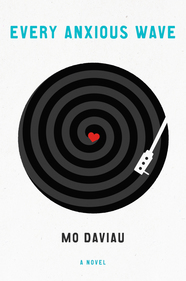
TUESDAY Beloved Seattle young adult author Sean Beaudoin debuts his new short story collection, Welcome Thieves, in a release party at Hugo House. Beaudoin promises “Music, cheap booze, a slideshow. Not the usual routine.” Welcome Thieves is his first book for adults.
WEDNESDAY It’s time for a big name: Jon Krakauer reads at Town Hall. His latest, Missoula: Rape and the Justice System in a College Town, is about the sexual assault epidemic on college campuses around the country. Have you seen this video of Krakauer shutting down a questioner last year? It’s very worth your time:
THURSDAY Tonight, Seattle Review of Books cofounders Martin McClellan and Paul Constant will present our book club picks at the beautiful Bainbridge Island bookstore Eagle Harbor Book Company. We invite you to come talk books with us.
But because we always offer additional events when there’s an SRoB-related happening, your ALTERNATE THURSDAY event is the very last Cheap Beer and Prose at the old Hugo House. It’s quite a lineup, too: Mattilda Bernstein Sycamore, Hanna Brooks Olsen, Jessica Mooney, and Jason Schmidt. This will be your last chance to buy $1 PBRs from the Hugo House bar. Make it count. (By “make it count,” I mean “drink until you start sobbing and clutching a column in the Hugo House while vowing to never let it go,” obviously.)
FRIDAY At the downtown branch of the Seattle Public Library, Dr. Damon Tweedy will read from his new book, Black Man in a White Coat: A Doctor’s Reflections on Race and Medicine. We know that African-Americans receive very poor health care in this country, but up until now, I’m not sure that anyone has really explored, in-depth, how people treat our African-American health care providers. This looks fascinating.
SATURDAY The African-American Writers Alliance group reading has become a tradition at Elliott Bay Book Company; the reading started over two decades ago, and it moved to Capitol Hill with the bookstore a few years back. Tonight’s readers: Alliniece Andino, Margaret Barrie, Jaye Ware, Gaylloyd Sisson, Minnie Collins, Lola Peters, Monique Franklin, Santiago Vega, Helen Collier, and event organizer Georgia S. McDade.
SUNDAY Celebrated tiny comic convention Exterminator City returns in a new location: Ballard’s Push/Pull, at the corner of Market & 24th. About two dozen Seattle cartoonists will be around to sell and discuss their very latest books.
The Sunday Post for February 21, 2016
The Secret Lives of Tumblr Teens
The extraordinarily nutso piece by Elspeth Reeve that everybody was talking about this week.
Each social media network creates a particular kind of teenage star: Those blessed with early-onset hotness are drawn to YouTube, the fashionable and seemingly wealthy post to Instagram, the most charismatic actors, dancers, and comedians thrive on Vine. On Facebook, every link you share and photo you post is a statement of your identity. Tumblr is the social network that, based on my reporting, is seen by teens as the most uncool. A telling post from 2014: “I picked joining Tumblr and staying active on here because: 1. I’m not attractive enough to be a Youtuber 2. Not popular enough for twitter 3. Facebook is dumb.” You don’t tell people your Tumblr URL, you aren’t logging the banalities of your day—you aren’t even you. On Tumblr, you can revel in anonymity, say whatever you want without fear of it going on your permanent record. You can start as many Tumblrs as you like, one for each slice of your personality, whether that’s gymnastics fandom (how I got into Tumblr) or Barack Obama-Harry Styles slashfic (it exists) or akoisexual identity (when your feelings of sexual attraction fade once they’re reciprocated). A Tumblr staffer pointed me to a blog called Dolph Lundgren & His Action Nips, which is just shirtless photos of the actor with his nipples turned into blinking GIFs.
Does Amazon's Data Speak for Itself
I try not to link to the same source twice in one weekend, but when one of my favorite writers (Paul Ford — you read his "What is Code" from last year, right?) takes on one of our favorite topics, Amazon, I can't just ignore it, can I?
I don’t have a good mental model for thinking across nine million objects, nor for exploring 80 million opinions. This is what people are talking about when they say “big data,” of course: No one knows what’s actually inside there, no one can make sense of all that stuff. No single human being could possibly read all of the reviews on Amazon in a single lifetime, and even reading the names of all the products would take six or seven months. Big data, for the most part, is made by humans—it is the record of what we clicked on, the banner ads we viewed, our paths through a site, multiplied by humanity. Sometimes it is seismic data or star charts too, but mostly what people are talking about with big data is data about human behavior that can be mined to create better predictive models for future human behavior.
One Man's Quest to Read — and Review — the World.
After just finishing our class teaching book reviewing at Hugo House, I've been thinking a lot about not only the nature and history of reviews, but what compells us to write them. Karan Mahajan's look at Michael A. Orthofer, and his the Complete Review, tease out some of the themes we love to linger on.
The Complete Review, “a selectively comprehensive, objectively opinionated survey of books old and new,” sits on the margins of the literary world, where it has flourished for sixteen years. As of last Friday, according to an analog counter on the site’s decidedly unglamorous homepage, it had reviewed three thousand six hundred and eighty-seven books, from a hundred different countries, originally published in sixty-eight different languages—an average of two hundred and thirty books a year. Virtually all of this criticism, and everything else on the Complete Review, is the work of Michael A. Orthofer, a fifty-one-year-old lawyer who was born in Graz, Austria, and brought up in New York City. Orthofer built the site—it took about five months; he coded it with basic HTML—on a P.C. at his home, in Manhattan, in 1999. For years, his name did not appear on the site, which claimed to be run by an “Editorial Board.” In 2009, on the site’s tenth anniversary, he began signing some reviews; the next year, he unmasked himself, discreetly, on the “About” page. In April, the retiring Orthofer will make his first serious bid for mainstream respectability, by publishing a book with the Columbia University Press. “The Complete Review Guide to Contemporary World Fiction” is the culmination of his work so far, as well as a continuation and a promise.
German Forest Ranger Finds That Trees Have Social Networks, Too
Sally McGrane brings you one of those rare moments where you have to reconsider everything you thought you knew about a topic, to have your brain cracked clean open. Also… looks around, whispers at you you know, Ents—.
PRESENTING scientific research and his own observations in highly anthropomorphic terms, the matter-of-fact Mr. Wohlleben has delighted readers and talk-show audiences alike with the news — long known to biologists — that trees in the forest are social beings. They can count, learn and remember; nurse sick neighbors; warn each other of danger by sending electrical signals across a fungal network known as the “Wood Wide Web”; and, for reasons unknown, keep the ancient stumps of long-felled companions alive for centuries by feeding them a sugar solution through their roots.
Understanding Seattle's high-rise boom
For an tall-building and architecture nerd like me, Paul Roberts great Crosscut article is a delightful read. Curious about the future of the Seattle skyline? Wondering why we don't have 110 story towers coming soon to downtown (hint: it has to do with one of our city's nicknames, Jet City)? Wondering what the heck is going to happen on that corner that just got the hurricane fencing put up? Then, friends, this is a must read:
Consider: there are currently 13 high-rise apartment or condo buildings of at least 24 stories in development or planning in the downtown area. The average is 39 stories. Another 24 high-rises are in the proposal pipeline, according to city and industry reports.
Not all the proposed towers will be built, of course, but those that are “launched” will represent a shift in downtown housing that is unprecedented not only in size but also in socioeconomics. Like 4/C, many are being “amenitized” for an upscale market. To be profitable, they will need rents of around fifty percent above the city average, according to several industry estimates. What’s more, to judge by the heavy emphasis on studios and one-bedroom units, developers are anticipating a downtown population that is childless and even single.
